Chinese culture vs western culture
中西文化差异四级作文

中西文化差异四级作文Title: Contrasts Between Chinese and Western Cultures.Culture plays a significant role in shaping societies and individuals. Chinese and Western cultures, while both rich and diverse, exhibit distinct differences in various aspects such as traditions, values, communication styles, and social norms.One of the fundamental differences between Chinese and Western cultures lies in their emphasis on individualism versus collectivism. Western cultures often prioritize individual achievements, personal freedoms, and self-expression, while Chinese culture tends to value harmony, family, and the collective good.Additionally, communication styles vary greatly between the two cultures. Western communication tends to be more direct and explicit, while Chinese communication often relies on implicit cues, nonverbal signals, and context. Understanding these differences is crucial for effective cross-cultural communication and collaboration.Moreover, traditions and customs differ significantly between Chinese and Western cultures. From food and festivals to social etiquette and beliefs, each culture hasits unique practices that reflect its history, values, and worldview.Despite these differences, both Chinese and Western cultures have their strengths and beauty. By appreciating and learning from each other's cultural heritage, we can foster mutual understanding, respect, and cooperation on a global scale.标题:中西方文化差异。
中西方文化差异英语作文

中西方文化差异英语作文Cultural Differences between China and the West。
Culture is an integral part of our identity and shapes our beliefs, values, and behaviors. The world is a diverse place, with different cultures coexisting and influencing each other. Among these cultures, Chinese and Western cultures are two of the most prominent and distinct. Inthis article, we will explore some of the significant differences between Chinese and Western cultures.1. Individualism vs. Collectivism。
One of the most fundamental differences between Chinese and Western cultures is their approach to individualism and collectivism. Western cultures are known for their individualistic values, where individuals are encouraged to pursue their goals and aspirations independently. In contrast, Chinese culture emphasizes collectivism, where the family and community are given priority over individualneeds and desires.2. Communication Styles。
英语对话Differences Between Chinese Culture And Western Culture

Differences Between Chinese Culture And Western Culture A:Hello, what are you doing.B:We are talking about the differences between Chinese and western cultures.C:Oh, I know you have some study about it, can you tell us some you know about it.D:We just know something about Chinese culture, we think values and beliefs play an important part in any culture.E:Yh, Showing respect is important for the Chinese, The Chinese have a strong sense of community, They generally think first in terms of "we" rather than "I".B:Society, friends and family are valued above the self. Stability(稳定) and harmony(和谐) are concepts(概念) the Chinese observe(遵守), especially the elder ones, and they believe the way to achieve these concepts is through respecting others and deserving(应得) their respect in return.A:You are right, Wisdom, seniority(长辈) and ability are important Chinese values, unlike Westerners who respect wealth, achievement and business success.C:Family is the foundation of society in China, Members of a family generally live together or nearby. They help and support one another andrespect the elders and parents. They are friendly with other people, but believe strong relationships need time and patience to build to make them solid and long-lasting.A:But In Western countries, you can make easily lots of friends, but friendships don't last long and they change a lot over time. Young adults generally have their own lives and see their parents and families a few times a year.D:In addition, Education is China's top priority, not only in the big and famous cities and schools, but also in rural areas. Western countries generally consider education a means to get a diploma; in China, education is a purpose in itself.E:Yes, Even if the new generation thinks the way the Chinese school enforces education "kills independent thought and creativity," there is much passion for learning and respect for intellectuals(知识分子) and knowledge in general.。
中外文化差异英语作文
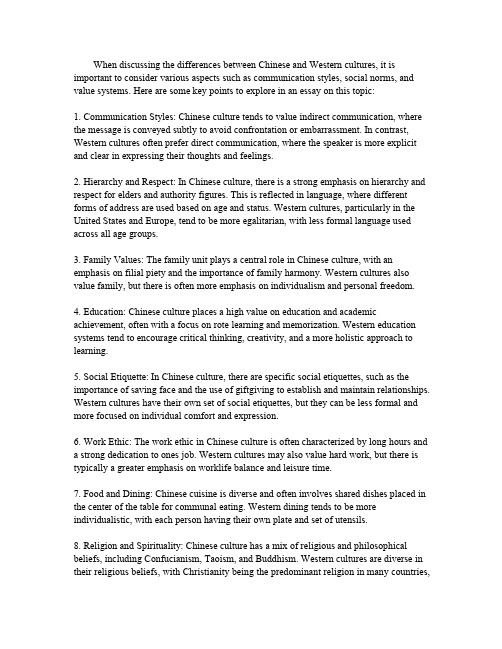
When discussing the differences between Chinese and Western cultures,it is important to consider various aspects such as communication styles,social norms,and value systems.Here are some key points to explore in an essay on this topic:munication Styles:Chinese culture tends to value indirect communication,where the message is conveyed subtly to avoid confrontation or embarrassment.In contrast, Western cultures often prefer direct communication,where the speaker is more explicit and clear in expressing their thoughts and feelings.2.Hierarchy and Respect:In Chinese culture,there is a strong emphasis on hierarchy and respect for elders and authority figures.This is reflected in language,where different forms of address are used based on age and status.Western cultures,particularly in the United States and Europe,tend to be more egalitarian,with less formal language used across all age groups.3.Family Values:The family unit plays a central role in Chinese culture,with an emphasis on filial piety and the importance of family harmony.Western cultures also value family,but there is often more emphasis on individualism and personal freedom.cation:Chinese culture places a high value on education and academic achievement,often with a focus on rote learning and memorization.Western education systems tend to encourage critical thinking,creativity,and a more holistic approach to learning.5.Social Etiquette:In Chinese culture,there are specific social etiquettes,such as the importance of saving face and the use of giftgiving to establish and maintain relationships. Western cultures have their own set of social etiquettes,but they can be less formal and more focused on individual comfort and expression.6.Work Ethic:The work ethic in Chinese culture is often characterized by long hours anda strong dedication to ones job.Western cultures may also value hard work,but there is typically a greater emphasis on worklife balance and leisure time.7.Food and Dining:Chinese cuisine is diverse and often involves shared dishes placed in the center of the table for communal eating.Western dining tends to be more individualistic,with each person having their own plate and set of utensils.8.Religion and Spirituality:Chinese culture has a mix of religious and philosophical beliefs,including Confucianism,Taoism,and Buddhism.Western cultures are diverse in their religious beliefs,with Christianity being the predominant religion in many countries,but also a significant presence of other religions and a growing number of nonreligious individuals.9.Time Concept:Chinese culture often has a more cyclical view of time,with an emphasis on traditions and the past.Western cultures tend to have a more linear view of time,focusing on progress and the future.10.Individualism vs.Collectivism:Chinese culture is generally more collectivist, prioritizing the groups needs over the individuals.Western cultures,particularly in the United States,are often seen as more individualistic,emphasizing personal goals and achievements.In conclusion,while there are many differences between Chinese and Western cultures,it is also important to recognize the similarities and the ways in which global interactions are leading to a blending of cultural practices.Understanding these differences can help promote crosscultural communication and respect.。
中西文化比较PPT
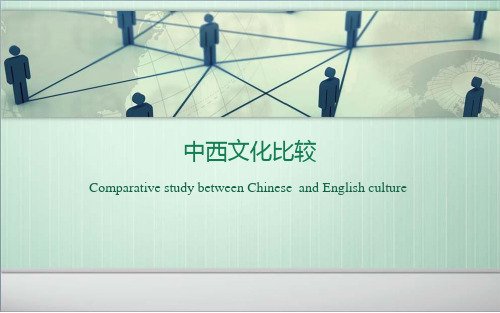
Essentials of Culture
• Dead (死文化 ) *products (achievements) – literature, art, music, artifacts, architecture 产品 — 文学、艺术、音乐、人工制品、建筑等
the West and China.
生活方式
• 西方:注重自我价值实现,人格独立。 • 中国:群居意识强,注重集体力量。
人际交往
• 西方:个性张扬 中国:谦虚含蓄
处理问题
• 西方:“不撞南墙不回头”。 • 中国:“不可直中取,只可曲中求”。
人际关系
• 西方:“交相利”。 • 中国:“多个朋友多条路”。
•
— Webster’s New International Dictionary
• 文化的结构划分有着多重标准
– 二分法:物质文化与精神文化 – 三层次说:物质、制度、精神 – 四层次说:物质、制度、行为、心态 – 六大子系统说:物质、社会关系、精神、艺术、语言符号、风俗
习惯。
• 本课程对于文化定义的概括:
earth重;视rea现lit实y a和nd稳s定tability fan重tas视y 幻an想d i与nn革ov新ation
stressed.
valued.
比较项 在总体上
西方文化
向外探求 客观世界 真——善、美
爱智 理性、科学型
中国文化
向内探求 心性问题 善——真、美
崇善 情感、伦理型
在思维方式上
不在兹乎。”
Chinese Culture VS. Western Culture

It’s a sign of the times--Chinese people are taking to celebrating Western traditional festivals in droves. Valentine’s Day, Halloween and Christmas are on all the A list. The media join in, building up the festivals through wide coverage. Above all, business people seize the opportunity to promote everything under the sun, adding more spark and whipping up the celebrations into a frenzy(狂怒) of buying, eating and bonhomie(友好氛围).
Festivals are blessed with special cultural meanings and are the cultural symbol of a nation. It’s an accumulation of the nation’s beliefs, ethics(伦理观) and emotions. Like a language it serves as an important way for a nation’s cultural inheritance, and emotional communication is the core of gathering people together. Accepting a festival means, to some extent, an acceptance of that culture. A stronger sense to celebrate that festival voluntarily stands for a deeper acceptance of that culture. If more Chinese celebrate foreign festivals and ignore the traditional festivals it will be detrimental to promoting our nation’s culture and enhancing the cohesion of the nation. In addition, if some day, most of the Chinese speak foreign languages, eat Western food, celebrate foreign festivals and watch foreign movies, our nation would be in big danger.
中国和西方人的文化差异英语作文
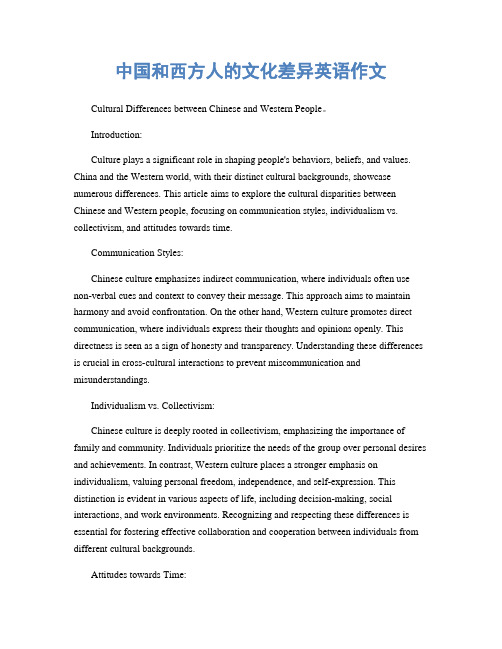
中国和西方人的文化差异英语作文Cultural Differences between Chinese and Western People。
Introduction:Culture plays a significant role in shaping people's behaviors, beliefs, and values. China and the Western world, with their distinct cultural backgrounds, showcase numerous differences. This article aims to explore the cultural disparities between Chinese and Western people, focusing on communication styles, individualism vs. collectivism, and attitudes towards time.Communication Styles:Chinese culture emphasizes indirect communication, where individuals often use non-verbal cues and context to convey their message. This approach aims to maintain harmony and avoid confrontation. On the other hand, Western culture promotes direct communication, where individuals express their thoughts and opinions openly. This directness is seen as a sign of honesty and transparency. Understanding these differences is crucial in cross-cultural interactions to prevent miscommunication and misunderstandings.Individualism vs. Collectivism:Chinese culture is deeply rooted in collectivism, emphasizing the importance of family and community. Individuals prioritize the needs of the group over personal desires and achievements. In contrast, Western culture places a stronger emphasis on individualism, valuing personal freedom, independence, and self-expression. This distinction is evident in various aspects of life, including decision-making, social interactions, and work environments. Recognizing and respecting these differences is essential for fostering effective collaboration and cooperation between individuals from different cultural backgrounds.Attitudes towards Time:Time perception also differs significantly between Chinese and Western cultures. Chinese culture tends to have a more flexible and fluid approach to time. Punctuality is not always a top priority, and schedules may be subject to change based on circumstances. In contrast, Western culture values punctuality and adheres to strict schedules. Time is seen as a limited resource, and being late is often considered disrespectful. Understanding these cultural variations in time management is crucial for avoiding misunderstandings and maintaining professional relationships.Conclusion:Cultural differences between Chinese and Western people manifest in various aspects of life, including communication styles, individualism vs. collectivism, and attitudes towards time. Recognizing and understanding these disparities is crucial for effective cross-cultural interactions and collaborations. By embracing cultural diversity and practicing cultural sensitivity, individuals can bridge the gap between different cultures, foster mutual understanding, and promote harmonious relationships.。
中西文化差异英语作文
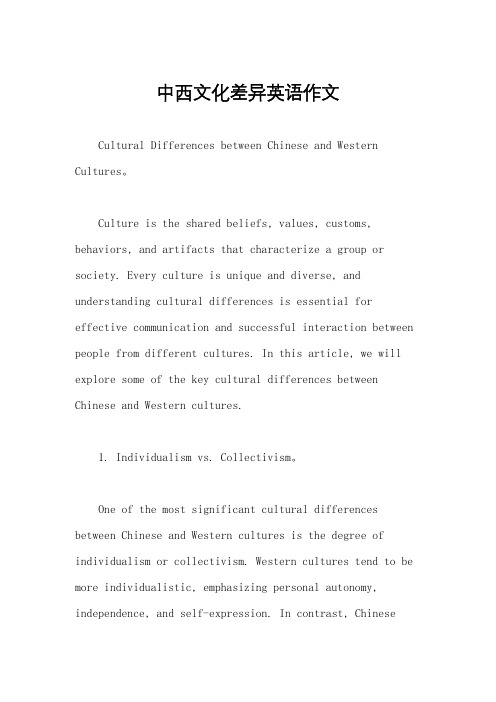
中西文化差异英语作文Cultural Differences between Chinese and Western Cultures。
Culture is the shared beliefs, values, customs, behaviors, and artifacts that characterize a group or society. Every culture is unique and diverse, and understanding cultural differences is essential for effective communication and successful interaction between people from different cultures. In this article, we will explore some of the key cultural differences between Chinese and Western cultures.1. Individualism vs. Collectivism。
One of the most significant cultural differences between Chinese and Western cultures is the degree of individualism or collectivism. Western cultures tend to be more individualistic, emphasizing personal autonomy, independence, and self-expression. In contrast, Chineseculture is more collectivistic, emphasizing group harmony, interdependence, and conformity. In Chinese culture, the needs and goals of the group take precedence over those of the individual.2. Communication Styles。
中国和西方文化礼仪的差异 The Differences between Chinese and Western Etiquette

中国和西方文化礼仪的差距摘要礼仪是人与人之间交流的规则是一种语言也是一种工具由于形成礼仪的重要根源――宗教信仰的不同使得世界上信仰不同宗教的人们遵守着各不相同的礼仪由于各国的历史和文化底蕴不同各国人民在进行礼尚交往时的习惯也有不少差异特别是中西方之间礼仪上的差异很大为了达到这种语言的共鸣中西方礼仪应该得到重视由此可见了解中西方交往的习惯差异是很有必要的往大处来说一个国家无论是在政治上还是在经济贸易中了解对方国家的礼仪习惯将有利于各国之间的交往随着中西方文化的不断发展中西方的礼仪正在相互融合西方人逐渐接受了中国文化中重情感等合理因素中国人也逐渐接受了西方文化中先进文明的礼仪和交往方式我们得承认当今国际通行的礼仪基本上是西方礼仪为此本文探讨研究了中西方礼仪的差异为了减少中西方文化礼仪上的差距使中西方人们之间的交往更加容易本文通过对中西方各个方面文化礼仪的不同展开讨论差距是有取其精华进行中外文化礼仪上的上的交流和沟通学习关键词:礼仪差异中国的礼仪西方的礼仪AbstractEtiquette is the rules of communication between people and it is a language but also a tool Since the formation of a major source of ritual –the difference of religious beliefs what making the world believe in different religions that people follow a different liturgical As different countries with different historical and cultural heritage Needless to say there are many differences in habits when people of all countries dealing during the ceremony Particularly in the etiquette between Western and Chinese is very large in order to achieve the resonance of the language the differences should be taken seriouslyThis shows that the habit of understanding between Chinese and Western communication is necessary Look at the big run a country both in politics or in economy and trade to understand the ritual habits of the other country it will be conducive to the exchanges between the countries With the continuous development of Chinese and western culture the Chinese and western etiquette is mutual confluence and westerners gradually accepted in Chinese culture such as heavy emotion and reasonable factors and the Chinese also gradually accepted the western culture advanced civilization etiquette and communication mode We must admit that todays international etiquette is basically the etiquette of western therefore this paper studied the differences between Chinese and western etiquette In order to reduce the gap between the Chinese andwestern culture etiquette make the interaction between Chinese and western people more easily This article discusses on various aspects of differences between Chinese and western culture etiquette Athough there are many differences and we should extrct its essence we can take a tall on chinese and wester cultural ceremonial exchanges and communication and learningKey words:Etiquette Differences Chinese etiquette Western etiquetteChapter one IntroductionEtiquette is people in social interactions as it is due to historical tradition customsreligious beliefs and the trend of The Times that the formation of the influence of such factors Both for people identity and for the people had to follow For the purpose of establishing harmonious relationsand the sum of the various line with the spirit and requirements of ritual code of conduct First we must understand the different etiquette is based on their cultural roots The Concept of Etiquette and the Reasons for Studying Etiquette Etiquette is the process and means to show waht respect to each other in interpersonal relationship Etiquette can be said to be a persons external appearance of inward cultivation and quality From the aspect of communication interpersonal etiquette can be regarded as a kind of art and a method of communication It is a common respect for person and a friendly practice in interpersonal relationshipsFrom the respect of transmitting interpersonal rituals can be roughly divided into chief etiquette business etiquette service etiquette social etiquette foreign etiquette and several other major branchesAn important reason that different countries have different histories and cultures there are a lot of differences in the habit of conducts and the ceremony especially between China and the West the jokes and the mistakes caused by misunderstanding is not unusual This shows that theunderstanding of the different etiquettes between Chinese and the Westerners is absolutely necessary In the office to understand each others customer will be conductive to the exchanges between the countries A person who understands others rituals and folk customs can be seen as respecting for others and can be easier to make a good impression on the other side Along with the constant development of Chinese culture and the Western culture Chinese ritual and the Western ritual are fusions The Westerners have accepted the reasonable factors in Chinese culture and other important feelings Chinese people have gradually accepted the advanced civilization of the Western culture and etiquette style However in real life the etiquettes impact due to cultural differences between China and the West still exists The paper explores the differences between Chinese etiquette and the Western etiquette to make Chinese communicate with the Westerners more easilyThe Origin of Chinese EtiquetteIn China etiquette is equal to courtesy and ceremony The essence of etiquette is the method of dealing with people and the belief in ghosts and spirits People consider that all things are controlled by the ghosts which can not be seen Therefore the etiquette is originated from the belief in ghosts and spirits as well as a special form of belief in ghosts and spirits China is a state of ceremonies Back to five thousand years ago etiquette used to be the core of traditional culture Up to now the etiquette has been really reformed Thusit becomes rituals of modern civilization Chinese etiquette in Chinese culture plays a quasi-legal role Etiquettes origins can be traced back to the early time of human beings It should be said that at the very beginning of the history of the Chinese nation etiquette was generated along with the human activities and with a primitive religion Etiquette is the system to deal with the three relationships among the people God and the ghosts It is said that there were five ceremonies in ancient China In fact etiquette can be divided into two main parts one is politics and the other is life Chinese legal system was bred during the establishment and implementation of the protocol The essence of etiquette is the way how to deal with people and the belief in ghosts and spiritsOur group culture attaches great importance to the family friends relationship regard it as of society cells But in western countries advocating independence self-improvement and self-reliance Chinese people value their traditional favorable king-subject honestly seniority hierarchical while in Anglo-American countries elders and junior dont dispute between equal status with young boundaries friends Chinese traditional ideas always advocating "four generations" "family reunion" has a "parents not in the words ancient preceptIn the Western countries the word etiquette used to mean keep off the grass Louis XIVs 路易十四gardener noticed that the aristocrats were walking through his gardens and then he put up signs etiquetteto warn them off The dukes and duchesses walked right past these signs Due to this blatant disregard the king of Versailles decreed that no individual was to go beyond the bounds of the etiquettes The meaning of etiquette would later include the ticket to court functions that lists the instructions on which a person would stand and what was to be done Etiquette like language has evolved but it still means literally keep off the grass Until the 1960s the importance of good manners was taught without question but with the liberated 70s it came a decline in the popularity of teaching proper etiquette In 2004 a new emphasis has been placed on returning to traditional values Proper etiquette and protocol have given children and adults a vital tool that provides not only a competitive edge but a sense of confidenceTravel" While in Anglo-American countries 18 children still lives at home depend on their parents life is incredible things they must rely on our own hands to live independently Similarly older parents even lost self-care ability general wont drag childrenThe Integration between Chinese and the Western EthicsIn modern society it seems that the world is getting smaller and smaller people are very active in frequent exchanges Human decency plays the basic role of social ethics It is the part which is the most straightforward and the easiest to operate during the process of globalization It has become a code of conduct guidelines and the ceremony together with the goal of establishing a harmoniousrelationship in social intercourse The international etiquette combines ritual characteristics of various countries and people and can be understood by the people of different countries and nations International etiquette can be shared by more and more different cultures and customs because etiquette itself is a cultural phenomenon Culture includes both ideas and customs and both spiritual habits and physical habits The etiquette obviously has the cultural identity which combines ideas and customs habits of mind and bodies It reflects the sense of the organic unity of moral and ethical behaviors Therefore many countries are paying great attention to combining international etiquette with national etiquette creatively Individual Freedom and TeamworkThe Westerners cherish individual freedom and independence They are not willing to be subjected to any limitation Chinese culture mostly emphasizes on collective interests They subordinate their personal interests to advocate collective interests They advocate unity cooperation and unisonThis means that etiquette in the Western and Chinese society is in a more appropriate locationChapter two Differences in several aspectThe differences of daily communicationDaily to greet Chinese people mostly used to say Did you eat " "Where are you going "etc It reflects the interpersonal kindness But for westerners this greeting will make them feel suddenly embarrassed even unhappy because westernerswill put this friendly greeting that just for Chinese to understand the "questioned" it means they are questioned because something and they feel others in their private lives In a word the behaviour make them feel uncomfortableIn the west daily to greet they only say "Hello" or due to the time saying "good morning" "Good afternoon" and"Good night" it is ok The Englishman meet you and he would say "it is a fine day today"If you are not very busy when you meet the people who are strangeryou can say "hello" and the answer to you should also be "hello" If someone want to shake hands with you of course you should shake hands with him and the same time you must remember to refuse to shake hands is very impolite Usually by older or the woman first give the hand On the appellation in Chinese only between several best friend and very closed people can directly call " first names" But in the west the rang of people directly call" first names" is wider than it in China In the west commonly used "sir" and "madam" represent the people who is a stranger you dont know the name You can call ten or twenties woman "young lady"and married women could be called "lady" etc Between family members it can absolutely regardless of degress generally can call the name each othe In the homethey can directly call father and mothers names For all the male elders they can call "uncle"and to all female elders they can call "aunt" It is in China is no good Chinese people mustdistinguish degress young and old otherwise they will be thinked of impoliteGenerally speaking you really cant accept the invitation you can politely declined to say you cant go and explain the reason Just say "I cant go to" or "I dont go to" is not polite Say "sorry" is not enough Just say "thank you" it can make the person puzzlinghe dont know you exactly mean wether you accept the invitation or decline the invitationWhen you meet people firstly you usually shake hands In addition long-lost friends when we meet and we usually shake hands However when they met and dont shake hands with a bow slightly bow and a smileit is also very politeChinese and western languages have many different farewell laguages If you farewell to patients Chinese people will say the word of"drink more water" "put on more clothes"and "sleep early" and so on to express the carefullness to patient But westerners never say that words such as "drink more water" because this words will be thought the backseat driver For example they will say "take care" or "I hope you will soon recover" etcDining etiquette differenceChinese people have a words that called "People regard food as their heave "民以食为天thus diet in the Chinese idea ia very important so Chinese people look the daily diet as their top thing Chinese dishes are exquisitely prepared deliciousChinese peoplepay more attation to food color smell taste shape meaning sometimes more than on nutrition to pay attention toBoth we think of foods delicious and beautifuland the nutrition is always be ignored Western diet attach importance to rang in food nutritions and absorptionit is a science diet idea Westerners pay more attention to the foods nutrition and neglect of the food color fragrance taste shape meaningTheir diet is to survive and health it seems does not important to tasteIn the dining atmosphereall of the Chinese like lively mood while their have a dinner Many people sit together to eat and drinkthey are talking and laughing Everybody together to build a kind of a warmly lively dining atmosphereExpect it is in a very formal banquets Chinese people have not very special etiquette on the table While the westerners in the dinner all of them like quiet and gracful environment They think they must pay attention to manners when they are on the table and not to lose courtesy For instance when they have a meal and can not with a very unpleasant soundWhen Chinese and western host a dinner it also has its own characteristics In China most of them base on the left for honour throughout the ages When fete guests we will firstly arrange the honorest guest seat on the left positionand arrange others in turn In the west right is for honour men and women seat interval and the couple also separatly seat Female guests seats is slightly more honour than male guests seatsfor the man he ready for the chair to the woman in his right is to show his respect In addition westerners have meal must sit upright they think bend down with the mouth gather to food is very rude but this is exactly the way Chinese people usually to eat Eatting western-style food owners do not advocate drink the more alcohol in Chinas table wine is essential thing With the wine drinking sometimes in order to show respect for each other and drinking the wine upChinese table is lively western table is quiet Chinese people want to use words and deeds to advised friends to drink and eat westerners just using the words to advise In the Chinese history Wine culture is regarded as business make friends and so on the social occasions essentials In the westpeople usually drink beer wine and they dont like urge others to drink In China the banquet demands to have dishes in a tablewhile westerners think it is not health practicing separate eating When Chinese banquetsthey toast each other and dance and sing Westerner requires less noise and less action and there is many dining programsDress etiquette differenceWestern man usually wear a conservative style suit in formal social occasions they wear white shirt and tie inside They like black so they usually wear black leather shoes Western lady usually wear a dress suits in formal occasions Another custom is woman wear earrings when they go out Western countries especially in the United States people like to wear leisure clothes at ordinary times such asT-shirts with jeansTodays Chinese dress increasingly westernized more and more people change their ideasjust as traditional qipao 旗袍and ZhongShanZhuang中山装and so on have withdrawn from the stage of history Formal occasions men and womens dressing have noting difference with the west In the usual civic lifeyou can see many people wear vest shorts and slipperswhich are not keep up with etiquette In all ages dress represents a kind of social culture which embodies a persons knowledge and aesthetics it is a persons identity temperament and the inherent quality wordless recommendation In a sense the dress is an art dress can convey emotion and meaning that isnt even use words can replace In different situations dressing oneself appropriately and moderately people give a person a favourable impression and dressing inappropriately then lower the ones identity and damage his own image In a social situation appropriate dress is a polite behavior to a certain extent it directly influences the interpersonal harmonyInflunce factors of the dressing effects the important one is to have a culture and elegant aesthetic ability the so-called "Knowledge makes a gentleman"腹有诗书气自华Second it has a sports bodybuilding quality Strong and handsome body is natural condition for dressing beauty Third is to grasp ordinary knowledge of dressing dress principle and dress etiquette knowledge this is indispensable conditions that reaching the inside and outsideharmonious and unified beautyWesterners pay attention to identity they ragard the clothes as the symbolwhile Chinese pay attention to lasting appeal 韵味If the western dress culture painstakingly pursue to performance beauty and totally ignore the dress ethics so China dress culture retains some moral systems more or less because it was affected by the traditional ethical values But the most representative dress is our countrys ZhongShanZhuang and western representative outfit is suitWearing the Maosuits 中山装not only we must buckle on all the buttons but also must be fastened collar button and rolling up sleeves is not allowed When wearing the double platoon suit you must buckle on all the buttons Wear single side three tablets buckle suit only can buckle up one button or two buttons that medium and first clasp Wear single side two claps suit only buckle up one button and dont allow to buckle on single-breasted suits all the button When wearing a suit the proper wear is white shirts and a tie the standard length of the tie is its foot arrive the straps bottomGenerally speaking Clothes makes the manand saddle makes a horse 人靠衣装马靠鞍Although judging a man only by his appearance is not pleasant 以貌取人不可取but in the modern life dress become an more and more important part of etiquette and dress properly or not not only is the embodiment of the individual grade more it can become the scale ofthe consideration that people to each other a of The great British author Shakespeare had said "A mans dress which is the most true portraiture of his upbringing grade and the status" 一个人的衣着是他的教养地位品味的最真实写照So in daily work and interactions especially in the formal occasions and dress is a problem that is more and more important and we are modern people pay more attentionBackground difference between China and WesternThe eastern civilization and western civilization is boring and developing in certain social historical conditions without which is excellent or worse The history of the west it is only 200 yearsa very short history and its people from various places and they came here to immigrateso many different nationalities and races got togetherThey embrace the oath "As long as what we can dream of what we will be able to realize 只要是我们能够梦想的我们都能实现" This is the western spirit which was built by the foundation of heroism and devotion With it just 200 years history could creat the splendid civilization in humans history the productive forces it have created highly more than all the productivity that all the past generation had created this is western charm What makes different of etiquette between Chinese and western is the eastern and western culture different environment and it is the root cause It makes the people of all countries have a totally different moral standards system and valuesThe difference between Chinese and western ideasEastern culture value collective and teamly spirit peoples dependence is very strong While western culture advocating independence and individual freedom For example China focus on cultivating individual moral characterrunning the family unisonmanage the nation in orderand peace will prevail throughout the universe 修身齐家治国平天下The personality is vital and this kind of personality is built on caring about the country love the collective harmonious family interpersonal harmony and so on basic thingsWhile people in the west their concept of legal system is stronger In this premise they advocate personal freedom and dont wish to be disturb from the government the church or other organizations they all like persist themselves old ways 我行我素In the family children were taught by concept that a infusion of self-reliance Young people are always hoped themselves can independent early and try to get rid of parents bundle they dont want to rely on family and parents otherwise they will lose freedom and lose others respect for them On this point Chinese culture is differentFamily is the most attentional collective life in China Parents cherish their children more than themselves lives and extremely want to ready everything and whatever they thought of for the children When children grew up and married parents would held a big wedding feast for theirchildren when the child has their own baby who is their grandson they will sacrifice their old ages to take care of her grandson namely they give all hope on their childrenand take care of the children over care is proved their children self-dependence ability is poor even in todays China which a planned economy to a market economy In the transition state-owned company worker extremely unwilling to loss the so called "iron rice bowl" 铁饭碗the dependence is the heritage of traditional Chinese culture The cultural differences between Chinese and western ideas which result in great difference between Chinese and western etiquette and there is a big foundamental differenceChinese and western to privacy different viewsIn the conversations remembering not to talk about personal business such as age marriage income religion etc Seeing that others buy things cannot ask its price If you see others return also cannot ask where he gone or where he is from otherwise they will disgust at you usually western use the sentence of "nose come into the somebodys private life " to express their disparagement to the people who askedWhile in China people take littal attention to boundaries of privacy people would not care about others in their own lives and not take any behavior to people who want to get a general understanding But between Chinese and American people Chinese always take very common words to ask each other familys life Americans might think you violated hisprivacy having a hidden purpose and a business would probably have be killedWhen Chinese people meet we often like noding heads and shaking hands or to salute with the hands folded 拱手致礼or slightly take a bow欠身then shake hands while the Westerners think the bow seemed inferior In the West especially in European and American countries hugging ritual is very common manners when you meet and leave kissing faces and kiss the hand ritual are also very common manners among westerners Shake hands date from western human half-barbaric half civilized period Today this habit gradually is regarded as meet and leaves shaking riyual and it have been accepted by most countries in the word In our country the handshake ritual not only it is often used when people meet and leave but also it is as a common behavior in congratulations and appreciate or encourage each other and so on some occasions So it is the most widely used etiquette in social communication The etiquette of meeting and leaving grandually evolve to today is "hello" and "goodbye" two phrases If we want to give more polite behavior we will shake hands again with each other In the disease popular today this habits of shaking hands which shows to us is more concise health and decent However in western countries meet will first touch the face kissing ritual and kiss the hand ritual this let us very uncomfortable and also cannot accept itDifferences in educationEtiquette education in China is deeply influenced by cultural and moral decency in the prominent position etiquette education in China emphasizes the moral law of etiquette education and the integration of practice etiquette education in China shows characteristics of a strong state intervention While in the west the combination of Etiquette Education and Moral Education of School Ceremonies can be found in moral education of the Western countries that etiquette is the major subject of moral education On the moral lesson in many countries people often teach students the etiquette knowledge in direct way The Western countries pay attention to comprehensive permeability of moral education rather than forcefully indoctrinate Etiquette education is not accepted They are generally not allowed to insist on instilling certain values They think the values of education can not be limited to a few hours teaching in a day but they pay attention to diversifying the form of moral education in schoolsIn educational culture there are many differences in various educational level between Chinese and western developed countries and responesd in different forms Untill today higher education of the differences between two countries is more and more wide In American universities according to the individual elective subjects the students can imply credit system 学分制Different subjects its credits is different as long as a student fufill enough credits who can graduate and get diplomasand degrees Previously we can see from relevant newspapers in the United States the student obtained several degrees this is normal Now we can understand American university system is very flexible college students studying at the college can learns a few professional course and just take enough credits they would be able to obtain the professional degreeWhile in Chinese universities where just confirmed professional direction a persons life his only lifetime is engaged in a profession it is possible to ignore his potentials in other respects And some aspects of language in Chinese education also different with westerns In China there are "差学生" but in America it is not this word they think it is considered bad mannersthis is a form of discriminationIn the thinking mode the Chinese thinking are abstract westerners is more specific The Chinese way of thinking from is from large to small such as address from a national provincial municipal and county township and village etc which embodies the overall thinking of the Chinese orders namely nature and human in a whole coexsitence of human and nature 天人合一world On the contrary westerners are from small to large from point to surface they think the whole is made up by parts The same way but not the same content and results which allows us to ponder Different of religionBuddhism佛教was introduced into China for more than a thousand years people believe in that there is "the Lord Buddha" 佛祖in the world and this related to many languages suchas 借花献佛"平时不烧香急来抱佛脚" etc The influence of religion in the western society is profound it involves in political economic social and all aspects of life especially of Christian cultures influence on English countries is more deep and rooted In in many western countries especially in Britain people believe in Christianity 基督教and they always says"God help me" They always get marrige in church Chapter three Theoritical Foundations1 Important Symbol of Human CivilizationProtocol is the product of the historical development of social etiquette It has distinctive characteristics of the times People have different understanding of the content of the protocol in different ages for different ethnic awareness The definition which is the origin of the earliest civilization culture is generally not in doubt Etiquette is the standard of human civilization It is also an important part of the community A nation which has a good quality of the nation is a polite and compliant one The formation of educational attainments is a gradual process Therefore every country in the world considers doing things properly as a symbol of civilization2 The Immortal Essence of the Western CivilizationModern etiquette is evolved from the traditional rituals The ceremony combines with criteria and become immoral essence of the Western civilization Along with the development of the times the nations and the。
中西方文化差异英语简单

中西方文化差异
Churchຫໍສະໝຸດ 04some interesting pictures about differences in Chinese and Western
中西方文化差异
• 四、 some interesting pictures about differences in Chinese and Western
中西方文化差异
Chopsticks vs Knife and Fork
中西方文化差异
Western:
they eat with separate plates
Chinese:
Sitting around the table
03
The difference between Architectural art
Western :
The bride dress is usually white,the groom a black dress,the whole wedding was a solemn seriousness. West are the romantic type wedding,the entire wedding from start to finish to the full romantic.
2018
Culture differences between Western and Chinese
中西方文化差异
讲课人:XX
CONTENTS
目 录
1 The difference between
food culture
2 Chopsticks vs Knife and
Fork
3 The difference between Architectural art
中西方文化的不同 英语作文
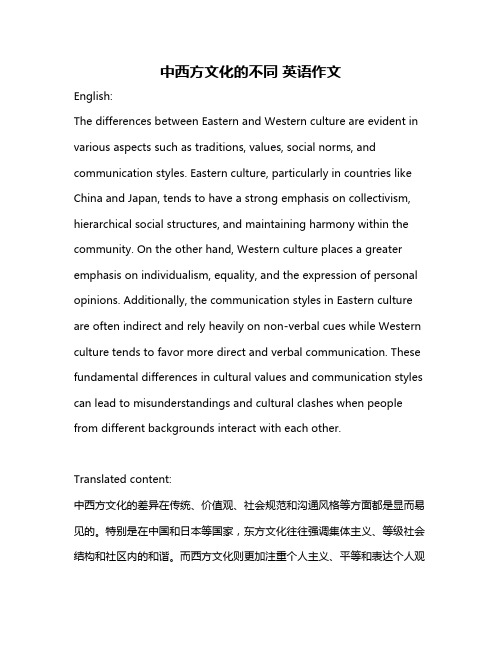
中西方文化的不同英语作文English:The differences between Eastern and Western culture are evident in various aspects such as traditions, values, social norms, and communication styles. Eastern culture, particularly in countries like China and Japan, tends to have a strong emphasis on collectivism, hierarchical social structures, and maintaining harmony within the community. On the other hand, Western culture places a greater emphasis on individualism, equality, and the expression of personal opinions. Additionally, the communication styles in Eastern culture are often indirect and rely heavily on non-verbal cues while Western culture tends to favor more direct and verbal communication. These fundamental differences in cultural values and communication styles can lead to misunderstandings and cultural clashes when people from different backgrounds interact with each other.Translated content:中西方文化的差异在传统、价值观、社会规范和沟通风格等方面都是显而易见的。
中西方文化差异PPT课件

didn't eat it.". Come on, let's go and have something to eat." Or, "if
you don't eat it, I'm going to invite you to my house." In a word, it is
sometimes mean to invite some-one to dinner.
Cultural differences between China and the West
-
2
中西方文化差异
Cultural differences between China and the West
-
3
宗教信仰
religious belief
中国主要信仰佛教、道教。
The main belief in Buddhism and Taoism in china.
▪Fortunately, not all greetings sound strange or arouse displeasure. There
are a lot of greeting words that are similar, some of which are just different.
-
8
▪幸而,打招呼的话并不都令人感到奇怪或者引起对方反感。有 许多打招呼的话是相似的,有些只是说法不同。在许多语言里, 打招呼的话往往是相似的,有些只是说法不同。在许多语言里, 打招呼的话往往与时间有关,但即使在一种语言中也有不一致的 地方。英语中有Good morning, Good afternoon, good evening 都相当于汉语中的“您好”,只是说的时间不同而已,但不说 Good noon。而 Good night (晚安;明天见;再会)根本不是 打招呼的话,这只是告别时说的话。
中西文化差异英文简短

中西文化差异英文简短中西文化差异是一个复杂而广泛的话题,以下是一些简短的英文描述:1.Value Systems(价值体系): Western culture emphasizes individualism, independence, and personal achievements, while Chinese culture highlights collectivism, interdependence, and harmony within the group.2.Communication Styles(交流方式): Direct and assertive communication is preferred in Western cultures, whereas indirect and polite communication is valued in Chinese culture to maintain social harmony.3.Time Orientation(时间观念): Western cultures tend to be future-oriented, emphasizing planning and scheduling, while Chinese culture is more present-oriented, focusing on the importance of the moment and relationships.4.Social Etiquette(社交礼仪): In Western cultures, people often maintain a personal distance and privacy, while inChinese culture, there is a greater emphasis on social connections, networking, and saving face.5.Perception of Authority(权威观念): Western cultures generally have a more democratic approach and value challenging authority, whereas Chinese culture places a high degree of respect for elders, hierarchy, and tradition.请注意,这些只是一些一般性观察,并不能涵盖所有个体情况。
中西文化差异英文PPT

Western:
2. Western culture is adventurous and exploration based. Westerners like to discover new things, invention and expand outwards. For instance, bungee jumping is considered adventurous and common in western culture, but you will probably find no-one doing such a thing in China.
Chinese:
8. A culture that expands internally rather than outwards. Some of the disadvantage of old chinese culture:
Summary:
. Westerners believe in individualism, and Chinese believe in collectivism. 2. The Western culture has the freedom to express affection freely, whereas the Chinese culture is puritanical. 3. Western and Chinese philosophies are unique and entirely different to each other. 4. The Chinese believe in relationships, and searching for inner bliss and happiness through meditation. 5. The Western culture believes in a materialistic approach, and has a pragmatic and emotional attitude.
western-culture-vs-chinese-culture
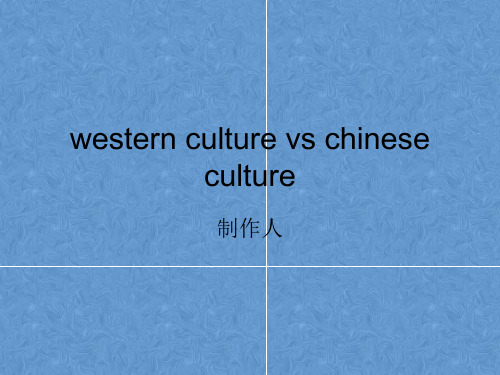
know we have known something about the difference culture between west and east .
It is simply that different people do the same things in different manners ,even though we can not not understand ,we should show the respect .I believe this is the best way to make our life become more comfortable and make the world more harmonious .
western culture vs chinese culture
制作人
as we all know that there are many differences between west and east .I think the culture is the biggest one .now ,we want to introduce something about it .
• we do'nt "thanks" all the time ,especially sayin it to our parents or brother ,but americian speak it frequently .
family education
• in china ,parents do everything for their children.but in western countries ,parents adovate free develoopment for their children
ComparisonofChineseandWesternCulture中西方文化对比
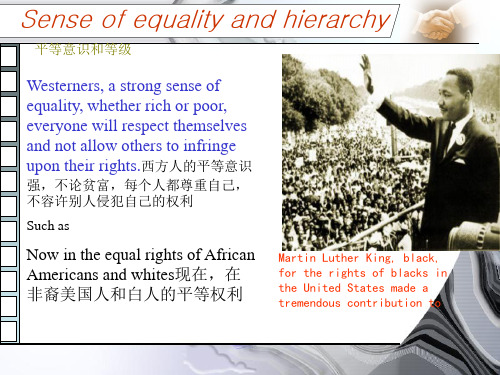
• 正如美国流行的一句谚语说:“只要我们努力,牛仔可以当总统
• Such people in the United States there are many, most notably the president of Microsoft's Bill Gates, the current U.S. president Barack Obama
强,不论贫富,每个人都尊重自己, 不容许别人侵犯自己的权利
Such as
Now in the equal rights of African Americans and whites现在,在 非裔美国人和白人的平等权利
Martin Luther King, black, for the rights of blacks in the United States made a tremendous contribution to
• At the same time, everyone can fully respect
others. In the United States, few people in their own pride in a prominent family background, but also very few people came with their own poor ashamed of, because they know that, as long as our own efforts, there will certainly be able to achieve success.同时,每个人也尊重他人,在美国,很少有人骄傲自
中西方文化的异同英语作文六年级
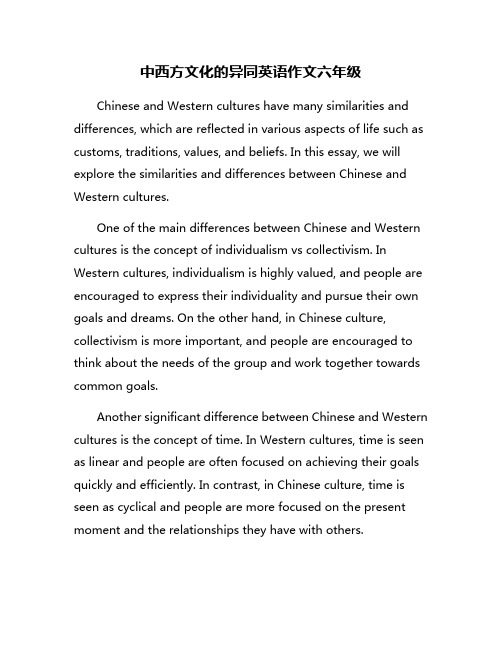
中西方文化的异同英语作文六年级Chinese and Western cultures have many similarities and differences, which are reflected in various aspects of life such as customs, traditions, values, and beliefs. In this essay, we will explore the similarities and differences between Chinese and Western cultures.One of the main differences between Chinese and Western cultures is the concept of individualism vs collectivism. In Western cultures, individualism is highly valued, and people are encouraged to express their individuality and pursue their own goals and dreams. On the other hand, in Chinese culture, collectivism is more important, and people are encouraged to think about the needs of the group and work together towards common goals.Another significant difference between Chinese and Western cultures is the concept of time. In Western cultures, time is seen as linear and people are often focused on achieving their goals quickly and efficiently. In contrast, in Chinese culture, time is seen as cyclical and people are more focused on the present moment and the relationships they have with others.One of the similarities between Chinese and Western cultures is the importance of family. Both cultures place a high value on family and the relationships that people have with their relatives. Families in both cultures often come together to celebrate special occasions and support each other during difficult times.Another similarity between Chinese and Western cultures is the emphasis on education. Both cultures value education highly and believe that it is essential for success in life. In both cultures, parents are often encouraged to support their children's education and help them achieve their academic goals.In conclusion, Chinese and Western cultures have many similarities and differences that are reflected in various aspects of life. While there are differences in concepts such as individualism vs collectivism and the perception of time, there are also similarities in the importance of family and education. By understanding and respecting the differences and similarities between these two cultures, we can learn to appreciate and celebrate the diversity of the world we live in.。
- 1、下载文档前请自行甄别文档内容的完整性,平台不提供额外的编辑、内容补充、找答案等附加服务。
- 2、"仅部分预览"的文档,不可在线预览部分如存在完整性等问题,可反馈申请退款(可完整预览的文档不适用该条件!)。
- 3、如文档侵犯您的权益,请联系客服反馈,我们会尽快为您处理(人工客服工作时间:9:00-18:30)。
Outline
Topic: Chinese culture VS. American culture in TV play
Thesis statement: Taken the TV play of both sides as a mirror, apparent differences can be drawn with respect to the pursuit of profit, the freedom of emotion release and the emphasis on innovation.
Ⅰ. Chinese culture is different from American culture in the pursuit of profit.
A.Chinese culture values fine balance between mutual benefits——the audience and the producers.
1.Reason1 for Chinese TV play: 2 episodes per day; satisfies the audience's desire.
2.Reason2 for Chinese TV play: one TV play at a period of time; makes profit in chronical way.
B.American culture gravitates towards maximizing profit.
1.Reason1 for American TV play: 1 episode per week; hooks the audience's curiosity.
2.Reason2 for American TV play: five different plays at five days; makes profit in parallel way.
Ⅱ. Chinese culture is distinct from American culture in the freedom of emotion release.
A.Chinese culture adheres to emotion-controlled personality as a model for excellent characteristic.
1. Reason1 for Chinese TV play: restricts unhealthy TV plays for show; no man available for so called "dirty" play.
B.American culture furnishes its people with spacious room for free emotion release.
1.Reason1 for American TV play:limits the teenagers and the kids to enjoy; any type of TV
play free for show.
Ⅲ. Chinese culture has little in common with American culture in the emphasis on innovation.
A.Chinese culture strongly encourages human to learn from the past experience.
1.Reason1 for Chinese TV play: digests new knowledge out of the past experience by repeating performing ancient classics. Eg. Four Classics; Tang and Qing dynasties stories.
B. the American culture takes innovation as the top quality.
1.Reason1 for American TV play: takes a lead in crux play; scientific fictions win splendid attraction.。
